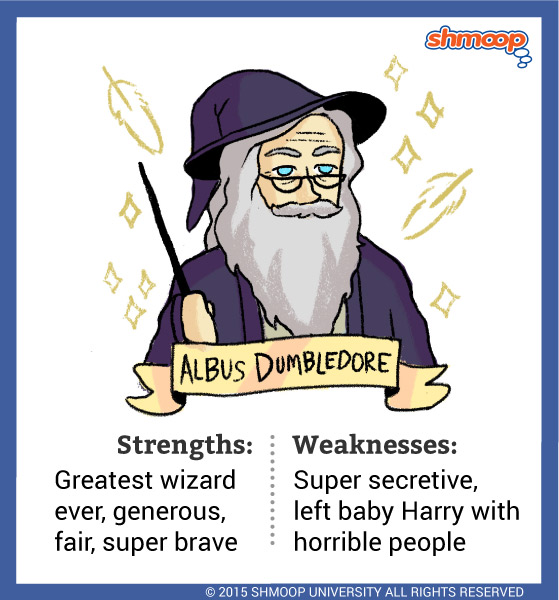Character Analysis

(Click the character infographic to download.)
Affiliation: Order of the Phoenix
Professor: Headmaster (Former)
Don't be confused – Dumbledore isn't exactly an active character in this book, unless you count a near-death experience and a talking painting. But we argue that he's still enough of a presence throughout Harry Potter and the Deathly Hallows to count as a major character. He's been a guiding light through the past six books, and here, his absence shakes up Harry's whole world. Furthermore, the stories flying around about Dumbledore's mysterious past dim that light at times, and make us wonder what to believe or not to believe about the former Headmaster.
Just as Voldemort is more complex than your everyday villain, Albus Dumbledore is much, much more complex than your average heroic mentor. While he's seemed like a pure force of good up all the way up until now, we see that this image is actually not the whole story. Check out what Rowling had to say about our beloved Dumbledore after Book 7 was released:
Although [Dumbledore] seems to be so benign for six books, he's quite a Machiavellian figure, really. He's been pulling a lot of strings. Harry has been his puppet […]. When Snape says to Dumbledore [toward the end of 'Hallows'], 'We've been protecting [Harry] so he could die at the right moment' – I don't think in book one you would have ever envisioned a moment where your sympathy would be with Snape rather than Dumbledore. (source)
Even though Rowling calls him "Machiavellian" right here, we wouldn't say that Dumbledore is bad – no, quite the contrary. The point of the whole Dumbledore side story here is to demonstrate that good and evil aren't exactly black-and-white categories – they've got a whole spectrum of grays. And even when someone like Dumbledore is definitely on the side of good overall, sometimes his methods are less than praiseworthy, and it can often take some venturing out of that category of good to return to it with conviction.
Basically, Dumbledore's flirtation with the dark side, in the attractive form of the golden-haired, merry young Grindelwald, shows us that ideas can take on lives of their own – the young Dumbledore's passion for learning and for magic demonstrates the fine line between good and evil in the abstract. Here's an interesting quote from Rowling in 2007 that also sheds a bit of light on the Dumbledore-Grindelwald friendship:
I always thought of Dumbledore as gay. [...] Dumbledore fell in love with Grindelwald, and that that added to his horror when Grindelwald showed himself to be what he was. To an extent, do we say it excused Dumbledore a little more because falling in love can blind us to an extent? But, he met someone as brilliant as he was, and rather like Bellatrix he was very drawn to this brilliant person, and horribly, terribly let down by him. Yeah, that's how i always saw Dumbledore. (source)
The idea of "For the Greater Good," (which young Dumbledore and Grindelwald share, and which both of them continue to espouse in their own separate ways) could go either way. While Grindelwald used it as an excuse to gain power and to abuse people, Dumbledore's take it on with the best of intentions. All along, we see that Dumbledore's actions are in order to save the world (certainly "good," rather than "evil"), but his ways of doing so, secretive and manipulative that they are, seem dubious at times. Dumbledore definitely always wanted to do the best thing for the wizarding world, but we (and he) are not always certain that he went about it in the best way.
Dumbledore himself recognizes his own faults and foibles, as we see when Harry finally talks to him, both in his near-death vision and in the departed Headmaster's portrait. Rowling also highlights Dumbledore's flaws and self-awareness in a 2007 interview:
Dumbledore knew what his weakness was and he learned it when he was 17. He learned that he – his weakness and his temptation was power. He recognized that he was not really to be trusted with power.
And so he remained at Hogwarts. And it was important to me to see that Dumbledore made that choice. And Harry – Harry I think admires him more for it. (source)
The Dumbledore that we see in Book 7 is quite different from the benevolent old wizard we thought him to be in the first six books. Starting with Book 1, we gain a picture of Dumbledore as a warm, content wizard with a fondness for Muggle candies. In the Sorcerer's Stone, when Harry asks Dumbledore what he sees when he looks into the Mirror of Erised (which shows a person's "deepest, most desperate desire"), Dumbledore replies, "I see myself holding a pair of thick, woolen socks." Hmm… But, by Book 7, we see Dumbledore as a far more human, flawed figure, with serious regrets about his life. So what does he really see in the Mirror of Erised? According to Rowling, he sees "his family alive, whole and happy – Ariana, Percival and Kendra all returned to him, and Aberforth reconciled to him" (source).
Dumbledore's greatest wisdom, in some ways, is the understanding of himself that he ultimately gains; he uses the knowledge he's earned from his past errors to try and make things right. Though Dumbledore's plans didn't come out exactly as he'd expected, his guidance, even from beyond the grave, continues to help Harry through his own final mission.